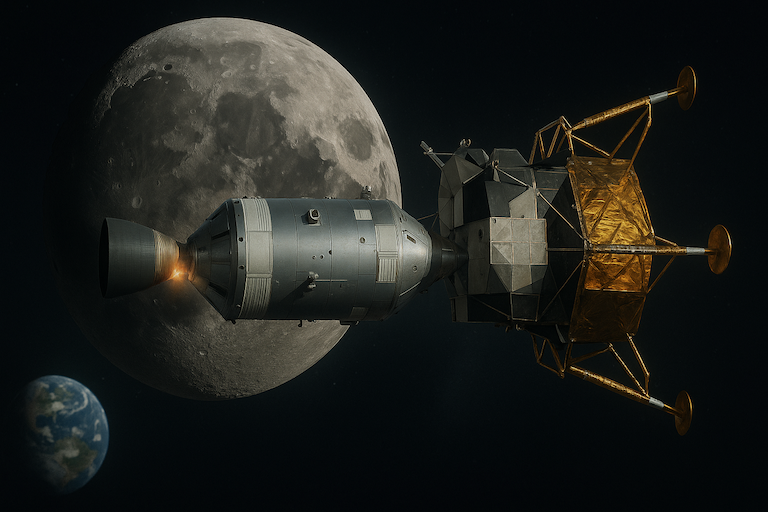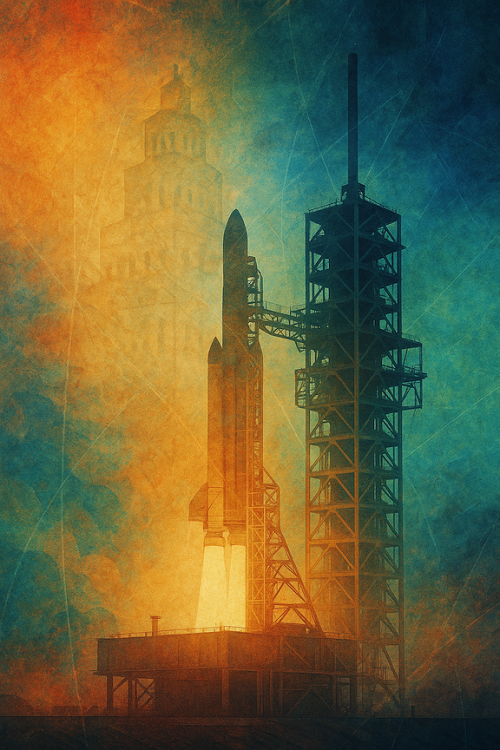It’s a “Wonder” Man Made It to the Moon — a Glimpse of Wonder entry™ — 2 of 5
It wasn’t the launch that made people nervous. Rockets had launched before. We’d already sent satellites, dogs, chimps, and a few very brave humans into orbit. But what kept the world holding its breath this time was what came after the roar — when the engines shut down and the silence of space took over.
From Earth to Moon is about 240,000 miles — give or take a few depending on the day. But the real distance wasn’t just in miles. It was in complexity. In courage. In math. They had to leave the Earth’s gravity and not miss. They had to sling through space along a path they couldn’t see, toward a target that was itself moving — all without brakes or second chances. The moon wouldn’t stop to let them catch up. It wouldn’t meet them halfway. They had one shot. And it had to be perfect.
And somehow — it was.
 Three days in a capsule no bigger than a small camper. Three men sealed inside a floating question mark, being carried by momentum and mid-course corrections. The tiniest miscalculation could’ve sent them hurtling into deep space — or crashing back to Earth. And all they could do was trust the math. Trust the computers. Trust the people back home watching the blinking numbers on their screens.
Three days in a capsule no bigger than a small camper. Three men sealed inside a floating question mark, being carried by momentum and mid-course corrections. The tiniest miscalculation could’ve sent them hurtling into deep space — or crashing back to Earth. And all they could do was trust the math. Trust the computers. Trust the people back home watching the blinking numbers on their screens.
The rest of us? We watched, too — through grainy TV sets and radio broadcasts that sounded like they came from another planet. And in a way, they did. What we heard wasn’t speeches or headlines — it was telemetry. Heartbeats. Fuel levels. Angles and orbits. And silence. So much silence. Because after all the noise it took to leave Earth, space was quiet. And in that quiet, a tiny dot on a black-and-white screen moved closer to a goal no one had ever reached.
That they even got there is a marvel. But the journey itself — the in-between — is its own wonder. Because space isn’t just empty. It’s exacting. Every thrust, every adjustment, every moment of stillness mattered. The universe doesn’t grant do-overs. That trip — that transit from one world to another — was a thread through the eye of a cosmic needle.
And yet — it happened. Not by chance, but by design. Not by miracle, but by math. And that math? That ability to measure, to compute, to plan — it came from somewhere. Jehovah gave us minds capable of solving problems so vast they might as well have been written across the stars. (Ecclesiastes 3:11)
But let’s not forget: this mission wasn’t born from humility. It was about pride. It was about politics. The moon race was a contest of nations — a Cold War between superpowers looking for proof of superiority. As the Awake! put it in July 1971, “National prestige was very much at stake.” Success in space wasn’t just about exploration — it was about making a statement. Planting a flag. Winning.
 Still, Jehovah knew what mankind could do when united — even for the wrong reasons. At Babel, he saw how far human ambition could go and said, “Nothing that they may have in mind to do will be impossible for them.” (Genesis 11:6) The Awake! continued: “Although man may have learned how to get to the moon, he still has not learned how to live in peace and harmony with his fellowman.” (Awake!, July 8, 1971, pp. 4–5)
Still, Jehovah knew what mankind could do when united — even for the wrong reasons. At Babel, he saw how far human ambition could go and said, “Nothing that they may have in mind to do will be impossible for them.” (Genesis 11:6) The Awake! continued: “Although man may have learned how to get to the moon, he still has not learned how to live in peace and harmony with his fellowman.” (Awake!, July 8, 1971, pp. 4–5)
And that’s the paradox. Humans can reach the moon — but not each other. We can leave the planet — but still fail to love the people on it. That kind of course correction takes more than math.
Even so, it’s a wonder. Not just that they made it — but that Jehovah allowed it. The God who formed the stars also formed the minds that mapped their way through them. And when human ability meets divine permission, it’s not surprising what can be done. It’s just breathtaking.
Edited by dljbsp
-
 1
1
-
 1
1
-
 1
1
-
 1
1

1 Comment
Recommended Comments
Join the conversation with your brothers and sisters!
You are posting as a guest. If you are already a member, sign in now to post with your existing account.
Note: Your post will require moderator approval before it will be visible.